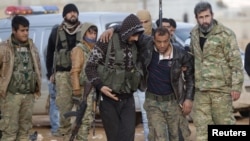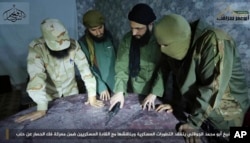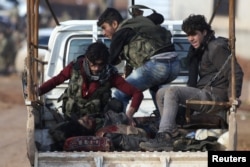Clashes between rebel groups and their onetime al-Qaida-linked ally, Jabhat Fateh al-Sham, have intensified in northern Syria with the jihadists accusing their former allies of having entered into a conspiracy against them.
The infighting, which erupted Tuesday as Russian-mediated peace talks were ending inconclusively in the Kazakh capital, Astana, has become a struggle for mastery between the jihadists and more moderate Islamist and secular-based groups in what is left of rebel-controlled territory in northwest Syria.
One of the triggers for the fighting are recent highly precise U.S.-led coalition airstrikes that killed more than 100 jihadist fighters in Syria.
Jabhat Fateh al-Sham, formerly known as the Al Nusra Front, said the strikes hit one of its camps. It suspects the targeting information was supplied by other rebel groups, say commanders with Western-backed Free Syrian Army militias.
Jabhat Fateh al-Sham said its fighters had attacked opposition groups to prevent a “conspiracy” against it. It called for an end to the fighting between the rebel groups, which have been battling to oust President Bashar al-Assad for nearly six years.
The fierce clashes appear to have shattered the rebel alliance in the war-wracked country.
Opposition groups aligned with the Free Syrian Army have offered a cease-fire proposal, but there has been no immediate response. FSA commanders say Fateh al-Sham has no interest in a real cease-fire, but is aiming to reshape the battlefronts in the north and to win a power struggle for control in Idlib and western Aleppo.
Political activists and the monitoring group the Syrian Observatory for Human Rights say clashes appear to be spreading from the western Aleppo countryside across Idlib and into coastal Latakia.
‘Irreversible consequences’
The clashes mark the most serious fratricide between rebel groups since jihadists targeted Western-backed insurgent militias in late 2014, wiping out the Syrian Revolutionaries Front and Harakat al-Hazm, two of Washington’s then favored militias.
Analyst Charles Lister, author of the book The Syrian Jihad, says the current fighting will have “irreversible consequences.”
He points to a statement issued by the Syrian Islamic Council, an Istanbul-based religious body that has considerable sway with rebel groups. Tuesday, the council issued a fatwa against Jabhat Fateh al-Sham, dubbing it heretical and calling on all rebels to fight the jihadist group.
Until 2016, Fateh al-Sham openly acknowledged it was the Syrian branch of al-Qaida, but last July announced it was cutting ties to any "external entity.” But it did not renounce publicly its oath of allegiance to Ayman al-Zawahiri, al-Qaida’s leader.
FSA commanders and analysts have since maintained the group, arguably the most effective insurgent force in northern Syria, has remained al-Qaida’s Syrian branch and its renaming was merely a marketing ploy designed to help it present itself as a Syrian movement focused purely on Assad’s ouster, and one no longer interested in waging international jihad.
This week, analysts from several organizations issued a report, "Combating al-Qaida in Syria", warning the terror group is acting to shape a safe haven in Syria as a key piece of real estate on Europe’s doorstep, allowing it strategic depth in its “long war” against the West.
“As a result of the strong emphasis placed by the former Obama administration "on the counter-Islamic State campaign, al-Qaida and its enablers in the Syrian opposition movement have benefited, slowly and steadily shaping the sociopolitical norms of many areas of opposition-controlled northwest Syria,” argued the report published by the Tahrir Institute for Middle East Policy.
Building a ‘new order’
The report said JFS has been subverting the pluralistic and nationalist goals of the Syrian uprising and is aiming “to build a new, enduring Sunni extremist order in Syria.”
Since the fighting erupted, Russian and Syrian warplanes appear to have stopped targeting moderate rebel groups in the north and to have focused strikes on the jihadists, a reversal of their previous strategy. Earlier this week, the Pentagon denied it was coordinating airstrikes with the Russians or the Assad regime, but some analysts argue the circumstances appear to be fast approaching when that might change, especially as the Trump administration has talked openly of working with any country to fight terrorist groups.
In Astana, observers say while there was no breakthrough in the talks that saw rebels and Assad delegates briefly meet face-to-face, there appeared to be serious exchanges between Russia and rebel negotiators. Some rebels say they are hopeful Moscow might play a constructive role in pressing the Syrian government to negotiate a political resolution to the long-running conflict.
Among the moves building up rebel hopes is a sudden change in the classification by the Russian defense ministry of rebel militias Moscow previously dubbed "terrorist," including Ahrar al-Sham, a onetime close ally of Fateh al-Sham, but now involved in fighting against the jihadist group.






